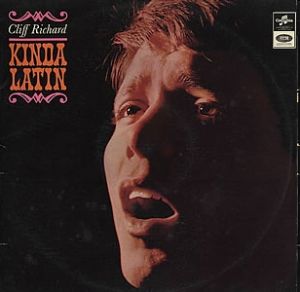
- Format: MP3

The logical successor to the Spanish and Italian language albums which he had unleashed over the previous 12 months, Cliff Richard's 11th album eschewed the linguistic gymnastics which marred those collections, and concentrated on the moods alone -- with stunning results. Handed a foreign language lyric sheet, he gives it his best, but rarely comes out on top. Left to his own English language devices, however, Richard's natural vocal powers can scarcely be faulted -- even the most practiced rehearsal can sound like an ad lib, and it doesn't matter how many times you catch that chuckle at the end of "Blame It on the Bossa Nova," it still seems as natural as breathing. It's a terrific album, and no mistake. Of the three orchestras recruited to the cause, only one had proven ability at re-creating even a halfway authentic Latin beat. Bernard Ebbinghouse and company had been providing similar accompaniment for Richard as far back as 1961's Listen to Cliff, and their re-creation of "The Girl From Ipanema" wraps itself around a genuinely excited vocal to create a minor masterpiece. Equally fetching is the low-key shuffle which drifts behind "Quiet Night of Quiet Stars" and a positively tenderized "Our Day Will Come." Yet they are not the only stars of the show. Both Les Reed and Reg Guest acquit themselves with similar grace, even if Reed is also responsible for the album's one genuinely ghastly error, a ham-fisted rearrangement of Dylan's "Blowing in the Wind" which brings that song's inclusion even deeper into question that it originally was. But one cannot help but admire the same orchestra's plucky assault on "Concrete and Clay" -- so plucky, in fact, that the horn parts seem convinced that they're auditioning for Herb Alpert, while the organ is dreaming of a job with Brian Auger. A mesmerizing mélange. Having got it wrong once in the past, Cliff has another go at "Fly Me to the Moon," and, this time, he nails it -- exuberant, excitable, everything, in fact, that the Love Is Forever version wasn't. "Quando Quando Quando" is even better; play it alongside the Cure's "Hot Hot" and you know precisely where Robert Smith got one of his best ideas from. Plus, that little growl right before the instrumental break is one of the sexiest noises Richars had made in years! It's fashionable to write off this artist's entire mid- to late-1960s output as the lost flailing of a pop star on the ropes -- and some of it does fit that billing. Kinda Latin, however, isn't simply the exception to prove the rule. It is one of the most enjoyable -- not to mention audacious -- albums in his entire catalog. And if it's this much fun to listen to, imagine what it must have been like recording the thing. Quando!